WHO expands trauma and mental health support to protect Somalia’s health workers
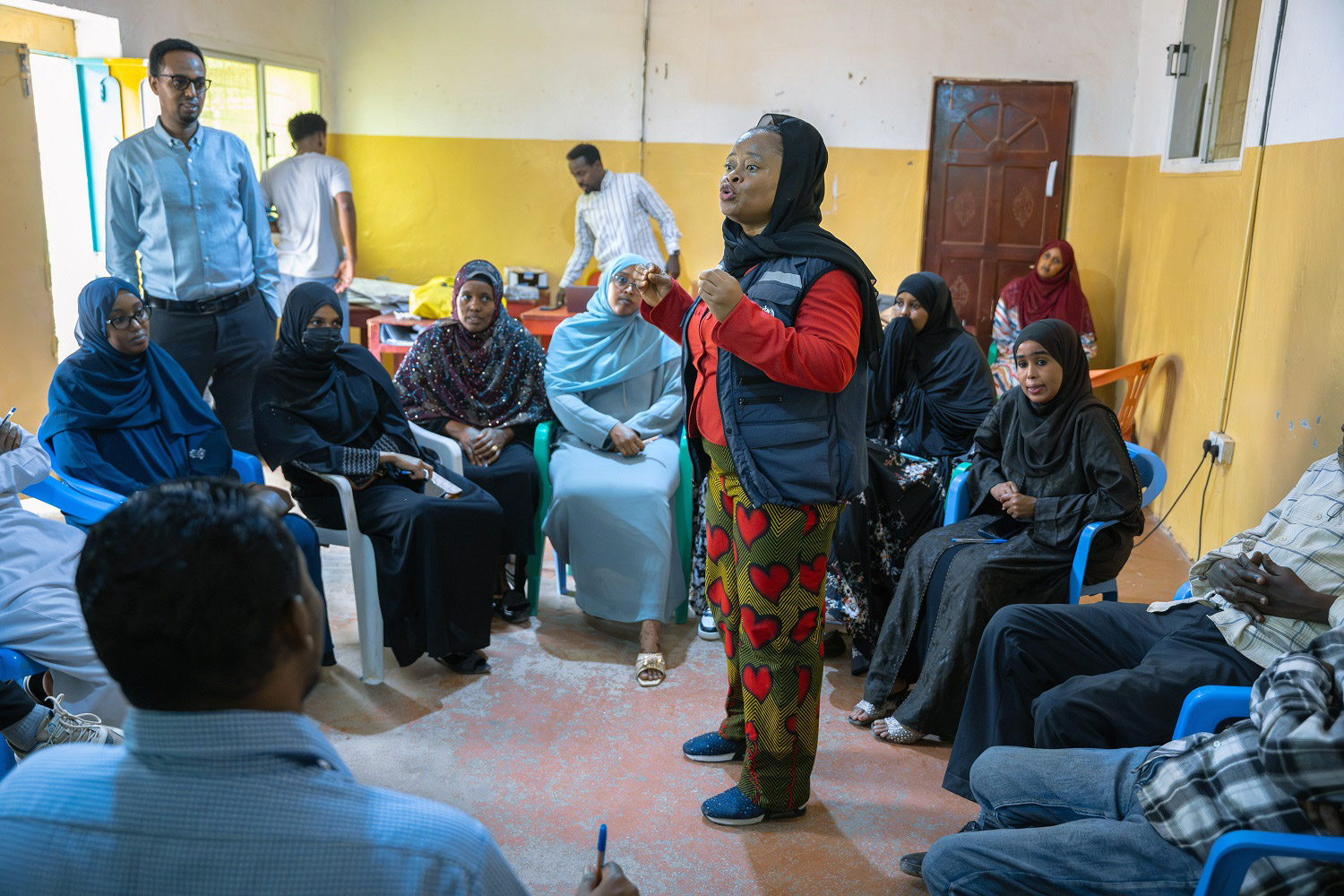 19 August 2025, Mogadishu, Somalia – In Somalia’s under-resourced hospitals, trauma patients often arrive to find blood supply and essential medical equipment shortages, trauma teams with limited capacity and inadequate systems in place for handling a surge in trauma patients. During mass casualty incidents these limitations cause delays that put lives at risk.
19 August 2025, Mogadishu, Somalia – In Somalia’s under-resourced hospitals, trauma patients often arrive to find blood supply and essential medical equipment shortages, trauma teams with limited capacity and inadequate systems in place for handling a surge in trauma patients. During mass casualty incidents these limitations cause delays that put lives at risk.
As violence escalates in parts of Jubaland and Somaliland, Somalia’s emergency health system and first responders face mounting challenges. Health workers, including doctors, nurses, security staff and cleaners, regularly operate under high pressure. They must make critical decisions while managing the emotional and physical demands of repeated exposure to trauma. Over time, this sustained stress can negatively impact their well-being and ability to deliver quality care.
To help alleviate these pressures, World Health Organization (WHO) Somalia launched a trauma preparedness initiative aimed at improving patient outcomes while safeguarding the health and mental well-being of health workers. Supported by the Contingency Fund for Emergencies, the initiative combines delivery of trauma supplies with training in mass casualty management, psychological first aid and trauma-informed care, helping ensure that health workers are equipped, supported and protected as they serve their communities.
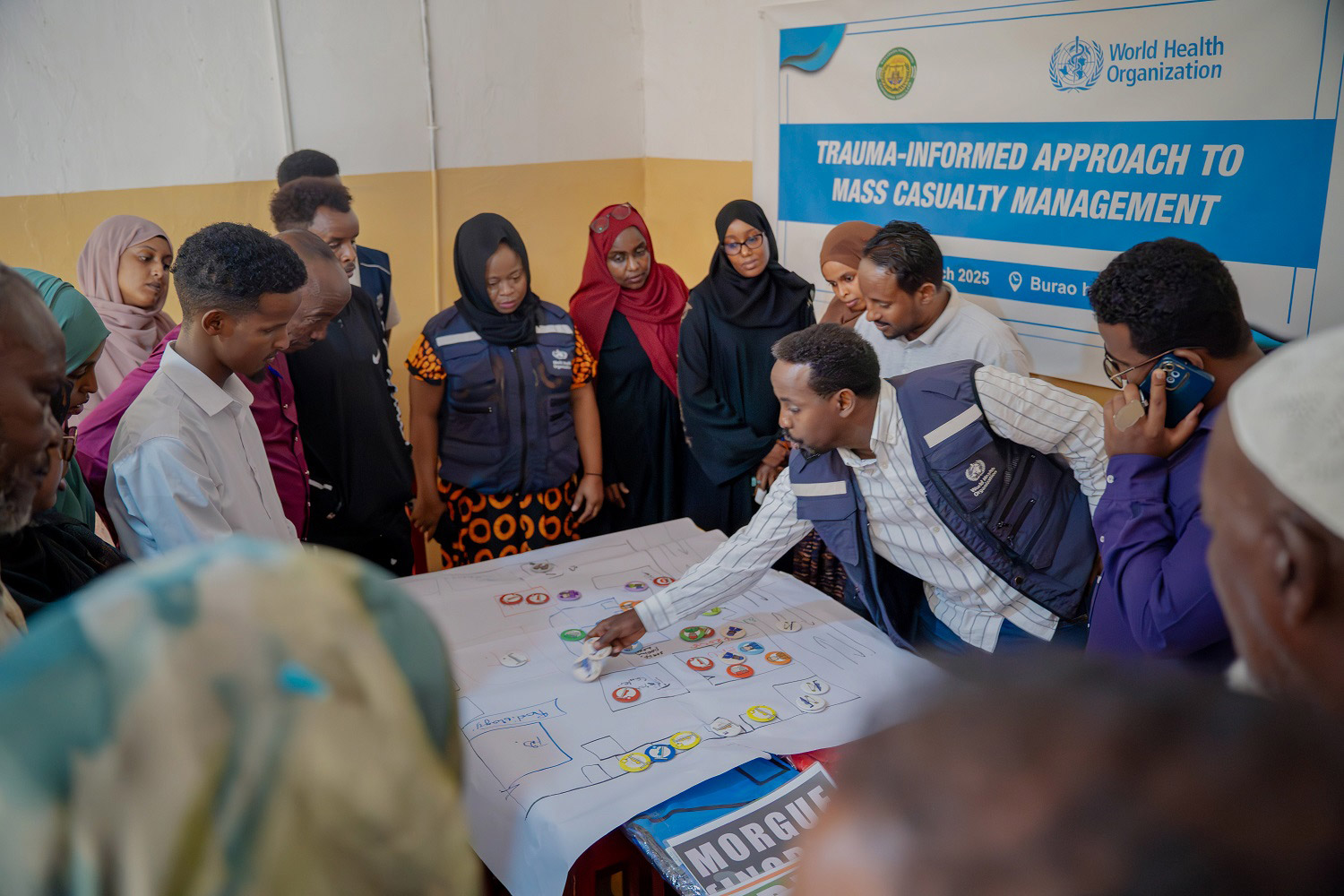 The training in Bossaso and Burao brought together 49 frontline staff, including doctors, nurses and support workers, to prepare for high-stress emergencies. Participants practiced triage under pressure and conducted full simulation drills to replicate the chaos of conflict-driven surges. Unlike most emergency trainings in Somalia, the programme guided frontline staff through self-care planning, stress regulation techniques and clinically supervised debriefings to help safeguard their mental health.
The training in Bossaso and Burao brought together 49 frontline staff, including doctors, nurses and support workers, to prepare for high-stress emergencies. Participants practiced triage under pressure and conducted full simulation drills to replicate the chaos of conflict-driven surges. Unlike most emergency trainings in Somalia, the programme guided frontline staff through self-care planning, stress regulation techniques and clinically supervised debriefings to help safeguard their mental health.
“The most encouraging outcome of this workshop was that participants reached a level where they understood the change is for them and their well-being,” said WHO Somalia’s Mental Health and Psychosocial Support Specialist Uchechi Chukwuma.
In Burao, frontline staff spoke about how the training will help them negotiate the challenges they face working in a region where conflict-related injuries are common. The knowledge and confidence gained from the sessions would empower them to save lives in the most stressful situations.
“This training was crucial for us because Burao General Hospital in Togdheer receives many war-related injuries. Strengthening our skills means we can respond more effectively and save more lives,” said Farhan Ali Osman, who work in the Emergency Department at Burao General Hospital.
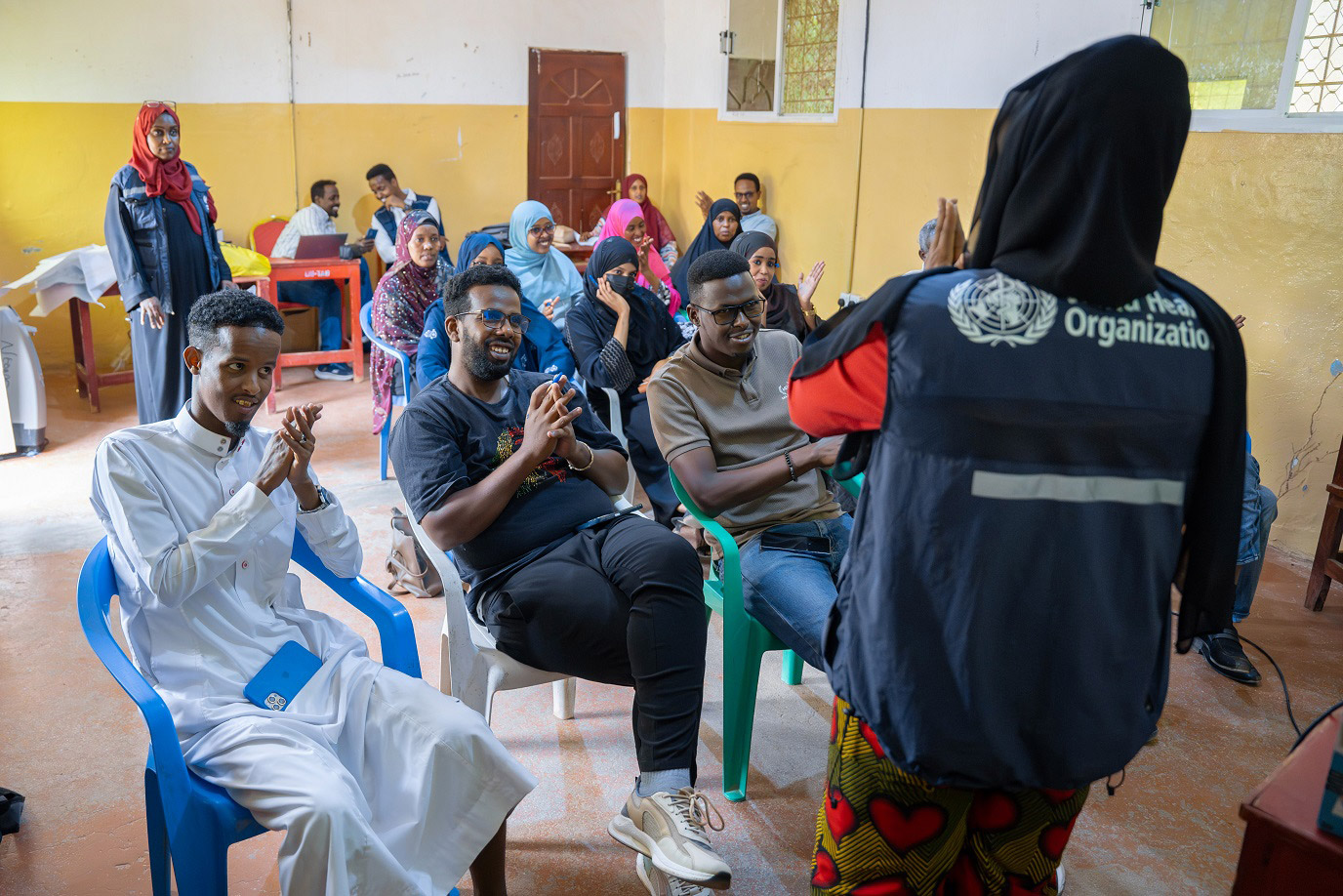 In parallel with the training, WHO distributed 32 trauma kits to hospitals across Federal Member States. Many of these facilities are in hard-to-reach or conflict-affected areas, including Jubaland, Hirshabelle, Galmudug, Puntland, Southwest State and Banadir. To speed up emergency response, the kits were pre-positioned at WHO hubs in Hargeisa, Garowe and Mogadishu.
In parallel with the training, WHO distributed 32 trauma kits to hospitals across Federal Member States. Many of these facilities are in hard-to-reach or conflict-affected areas, including Jubaland, Hirshabelle, Galmudug, Puntland, Southwest State and Banadir. To speed up emergency response, the kits were pre-positioned at WHO hubs in Hargeisa, Garowe and Mogadishu.
In Bosaso, a full-scale simulation tested clinical response and coordination across departments. Using colour-coded triage wristbands, designated patient zones and phased activation protocols, the drill revealed strong staff cohesion while identifying logistical gaps such as documentation and equipment shortages.
The initiative supports longer-term system strengthening. A draft mass casualty management plan was developed for Bosaso General Hospital which can serve as a model for other regional facilities. Meanwhile, a coordination workshop co-led by WHO and the United Nations Population Fund (UNFPA) in Mogadishu brought together partners to integrate mental health and psychosocial support, gender-based violence services and trauma protocols into the broader humanitarian response.
WHO Somalia aims to scale this approach to hospitals nationwide. With continued collaboration from the Ministry of Health and key partners, the goal is to reduce trauma-related mortality and morbidity while protecting frontline workers.
The health system can’t heal without its workforce healing too.
For more information:
Myriam Haberecht
Lead External Relations/Communications
WHO Somalia (
Kira Britten, Donor Communications Officer
As Somalia marks World Breastfeeding Week, the government and communities are being urged to strengthen breastfeeding support
3 August 2025, Mogadishu, Somalia – Somalia joins the rest of the world in marking World Breastfeeding Week, held annually from 1–7 August.
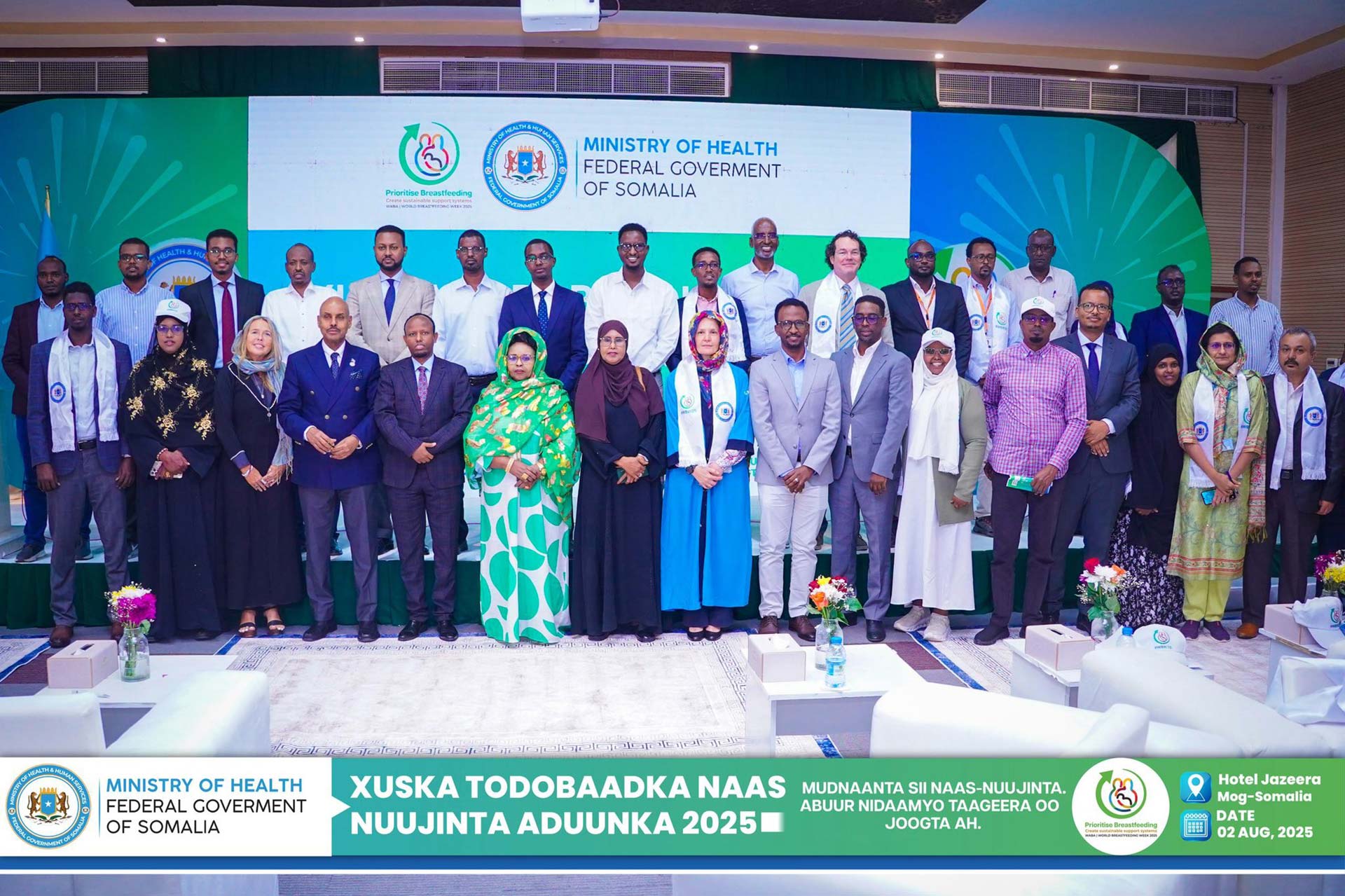 This year’s theme, Prioritize Breastfeeding: Create Sustainable Support Systems, recognizes the barriers that breastfeeding mothers face – inadequate support, misinformation and systemic challenges that include a lack of paid time off from work to breastfeed, of parental leave after the baby is born, and inadequate protection from marketing of breastmilk substitutes – and calls on the government, the health system, workplaces and communities to build enduring, equitable frameworks that support breastfeeding mothers and empower families.
This year’s theme, Prioritize Breastfeeding: Create Sustainable Support Systems, recognizes the barriers that breastfeeding mothers face – inadequate support, misinformation and systemic challenges that include a lack of paid time off from work to breastfeed, of parental leave after the baby is born, and inadequate protection from marketing of breastmilk substitutes – and calls on the government, the health system, workplaces and communities to build enduring, equitable frameworks that support breastfeeding mothers and empower families.
Speaking at a commemorative event in Mogadishu this morning, Health Minister Dr Ali Haji Adam noted how breastfeeding delivers lifelong benefits, not just for children but for mothers, families and communities.
“The government is committed to creating sustainable support systems that protect, promote and enable breastfeeding across the country,” he said. “We will continue to implement policies that strengthen maternal health services, train frontline workers, raise awareness and ensure mothers have the support they need at home, in health facilities and the workplace. As we mark World Breastfeeding Week, we reaffirm our promise to build an environment where every mother feels empowered to give her child the healthiest possible start in life.”
“Breastfeeding is one of the most effective ways to give children a healthy start – improving cognitive development, strengthening immunity and protecting both infants and mothers from chronic diseases,” said World Health Organization (WHO) Somalia Deputy Representative Dr Kamil Mohamed. “But mothers cannot do it alone. We must create sustainable support systems through quality health services, family-friendly workplace policies and stronger legal protections against the unethical marketing of breastmilk substitutes.”
Breastfeeding is more than a feeding choice. Fully integrated across policies, health systems, workplaces and communities, it becomes a pillar of sustainable development.
“We owe it to babies, the future generation of citizens, and to ourselves to ensure that they have the best start in life through exclusive breastfeeding for 6 months and continued breastfeeding for up to 2 years,” said United Nations Children’s Fund (UNICEF) Representative Sandra Lattouf. “The benefits of breastfeeding outweigh any perceived negatives by a long mile. We need to ensure that every mother, her family and the child are supported throughout their breastfeeding journey with the knowledge, resources and encouragement they need. A healthy and thriving child is an asset for the family and nation.”
A sustainable breastfeeding system requires an all-of-society approach that ensures every mother has the support, environment and resources to breastfeed successfully, from conception through the first 2 years of the child’s life and beyond.
This year, World Breastfeeding Week aims to inform Somali citizens about their role in creating supportive and sustainable environments for breastfeeding. Key objectives include promoting family-friendly workplace policies such as paid maternity leave and breastfeeding breaks, empowering communities through peer support networks and culturally sensitive education and advocating for policies that protect breastfeeding from commercial influence and misinformation.
In Somalia, while 6 in 10 children are breastfed within an hour of birth, just 1 in 3 babies are exclusively breastfed for the first 6 months of life.
A major reason for the low rates of exclusive breastfeeding is the absence of legal measures against the unethical marketing of breastmilk substitutes, which are advertised as an alternative to breastfeeding. Somalia has made minimum progress in adopting the Code of Marketing of Breast Milk Substitutes which restricts the marketing of products intended to replace breastmilk, protecting mothers from commercial influence on their infant feeding choices.
Adoption of the Code of Marketing of Breast Milk Substitutes is part of Somalia’s obligations under the Convention on the Rights of the Child which it ratified in 2015. Renewed efforts are urgently needed to fully adopt the Code of Marketing and bring Somalia in line with countries that have a comprehensive and enforceable legal framework that protects babies and mothers from the marketing of breastmilk substitutes.
Media contacts:
Mohamed Osman, MoH Head of Communications,
Victor Chinyama, UNICEF Chief of Communication,
Khadar Hared, WHO Communication focal point,
Newly released data shows Somalia making notable progress in child immunization
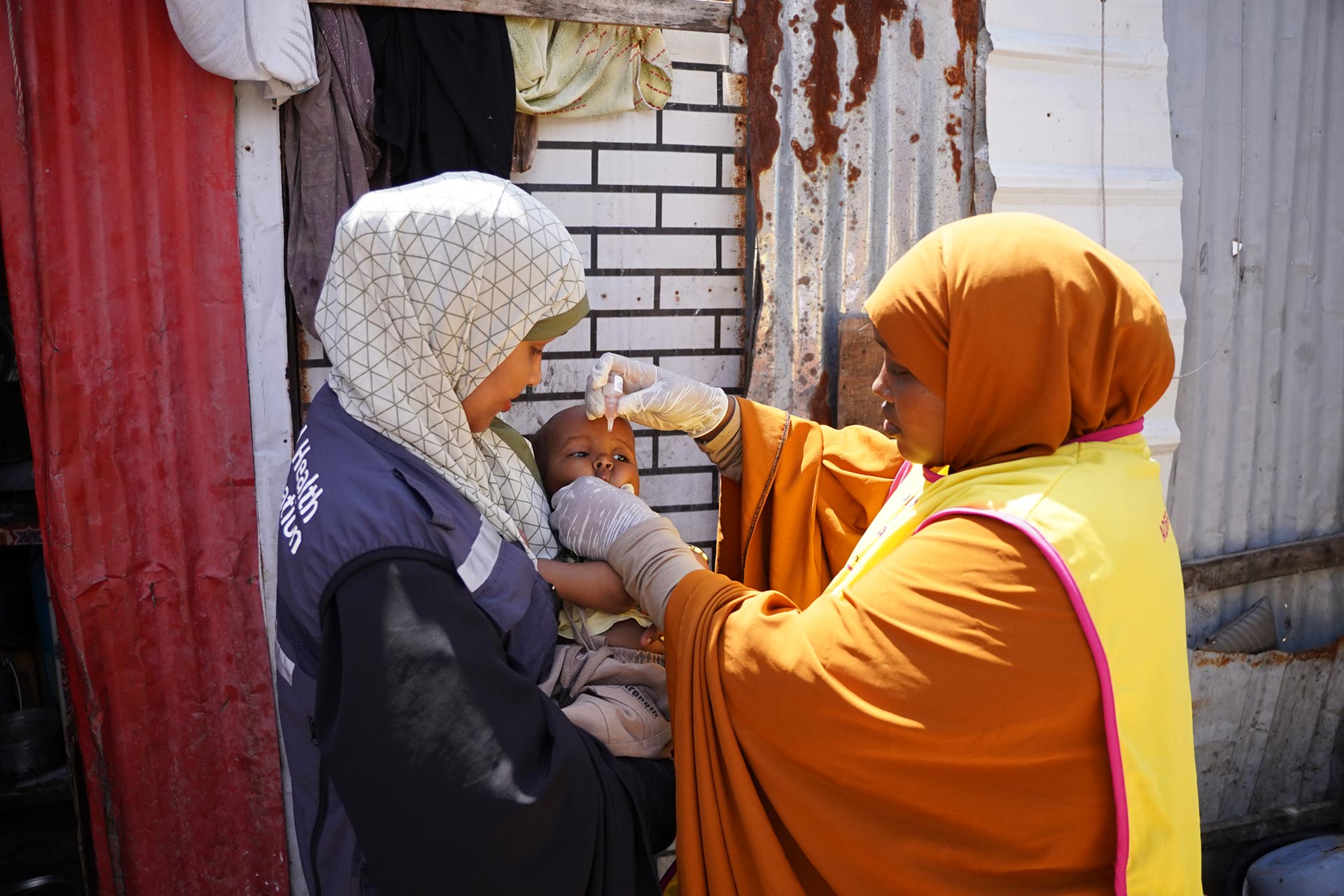 15 July 2025, Mogadishu, Somalia – The annual World Health Organization (WHO)/United Nations Children’s Fund (UNICEF) Estimates of National Immunization Coverage (WUENIC) released today reports that 70% of children in Somalia are fully vaccinated, an increase of 28% between 2012 to 2024, with steady improvements registered across all antigens since 2019.
15 July 2025, Mogadishu, Somalia – The annual World Health Organization (WHO)/United Nations Children’s Fund (UNICEF) Estimates of National Immunization Coverage (WUENIC) released today reports that 70% of children in Somalia are fully vaccinated, an increase of 28% between 2012 to 2024, with steady improvements registered across all antigens since 2019.
WUENIC presents country level immunization datasets on key infant and childhood vaccinations, allowing the identification of areas where progress has been made, where opportunities remain and where immunization coverage has declined.
Somalia has invested heavily in upping coverage rates. In 2024, the accelerated Big Catch-Up initiative, spearheaded by the Federal Ministry of Health and Human Services in collaboration with UNICEF and WHO, targeted zero-dose children – those who have never received a single vaccine – and children with partial (incomplete) vaccination. This year, multiple vaccination campaigns have been held, and pneumococcal conjugate vaccine (PCV) and rotavirus vaccines introduced to address childhood pneumonia and diarrhoea, the leading causes of death in children under 5 in Somalia.
“Immunization is one of the most cost-effective public health interventions that prevents vaccine-preventable diseases,” said Minister of Health and Human Services H.E. Dr. Ali Haji Adam. “To continue strengthening the health system in Somalia we must enhance the capabilities of our frontline health workers and increase efforts to create awareness in communities about lifesaving vaccines. We all have more work to do.”
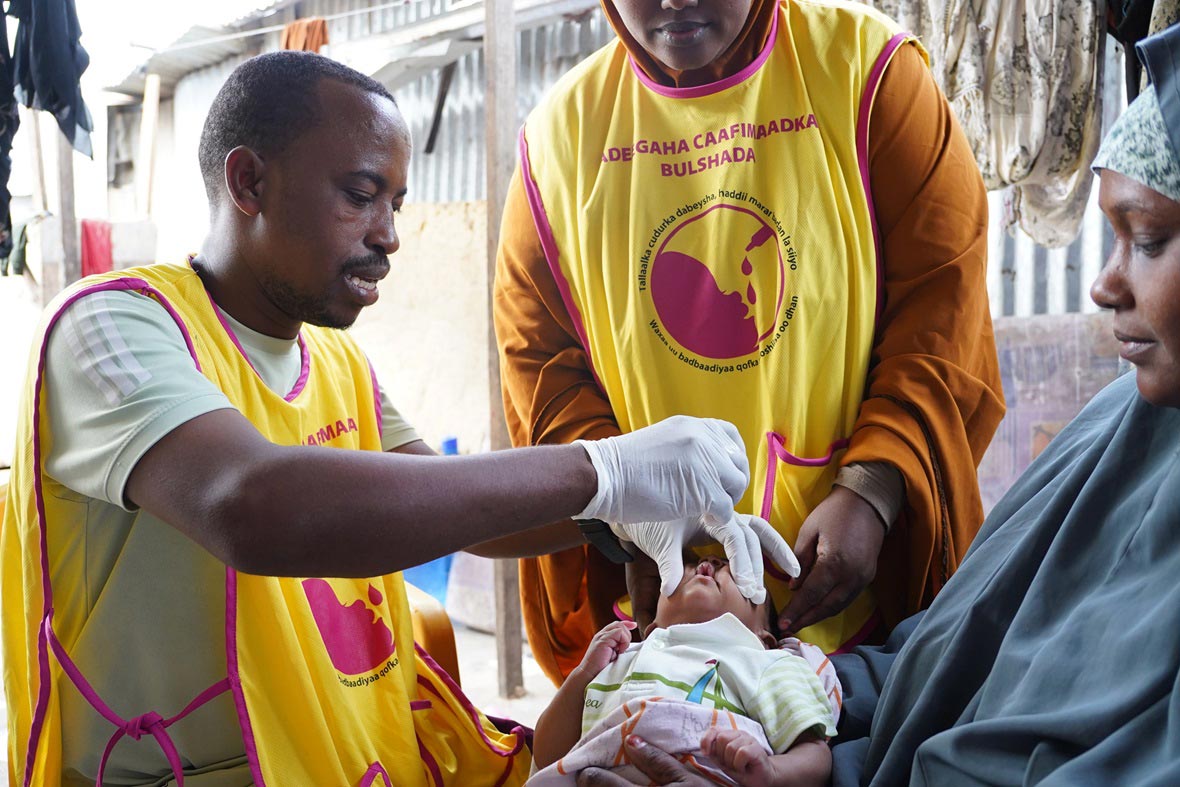 Expanding routine immunization coverage in Somalia has long been hampered by ongoing conflict, displacement, inaccessibility and limited health infrastructure. For decades coverage was below 50%, leaving an estimated 1.5 million children missing out on vaccines. It is encouraging to note that through the Big Catch-Up, nearly 700 000 zero-dose children received their first dose of pentavalent vaccine which protects against potentially fatal diseases like diphtheria and whooping cough.
Expanding routine immunization coverage in Somalia has long been hampered by ongoing conflict, displacement, inaccessibility and limited health infrastructure. For decades coverage was below 50%, leaving an estimated 1.5 million children missing out on vaccines. It is encouraging to note that through the Big Catch-Up, nearly 700 000 zero-dose children received their first dose of pentavalent vaccine which protects against potentially fatal diseases like diphtheria and whooping cough.
“Alongside the Big Catch-Up campaigns, Somalia has strengthened routine immunization through outreach to underserved areas in collaboration with neighbouring countries, and with the recent introduction of 2 new lifesaving vaccines, PCV and rotavirus. These efforts are vital, as over 1.5 million children have missed essential vaccines. Intensified action continues to address the ongoing polio outbreak that began in 2017,” said WHO Representative in Somalia Dr Renee Van de Weerdt.
Reliable data is a crucial pillar of any health system. To strengthen data quality, UNICEF, in collaboration with WHO, supported the Federal Ministry of Health in conducting a nationwide data quality improvement exercise across all districts and health facilities. This initiative, combined with investments in the overall immunization system and advocacy efforts, resulted in a significant improvement in data quality and vaccination rates.
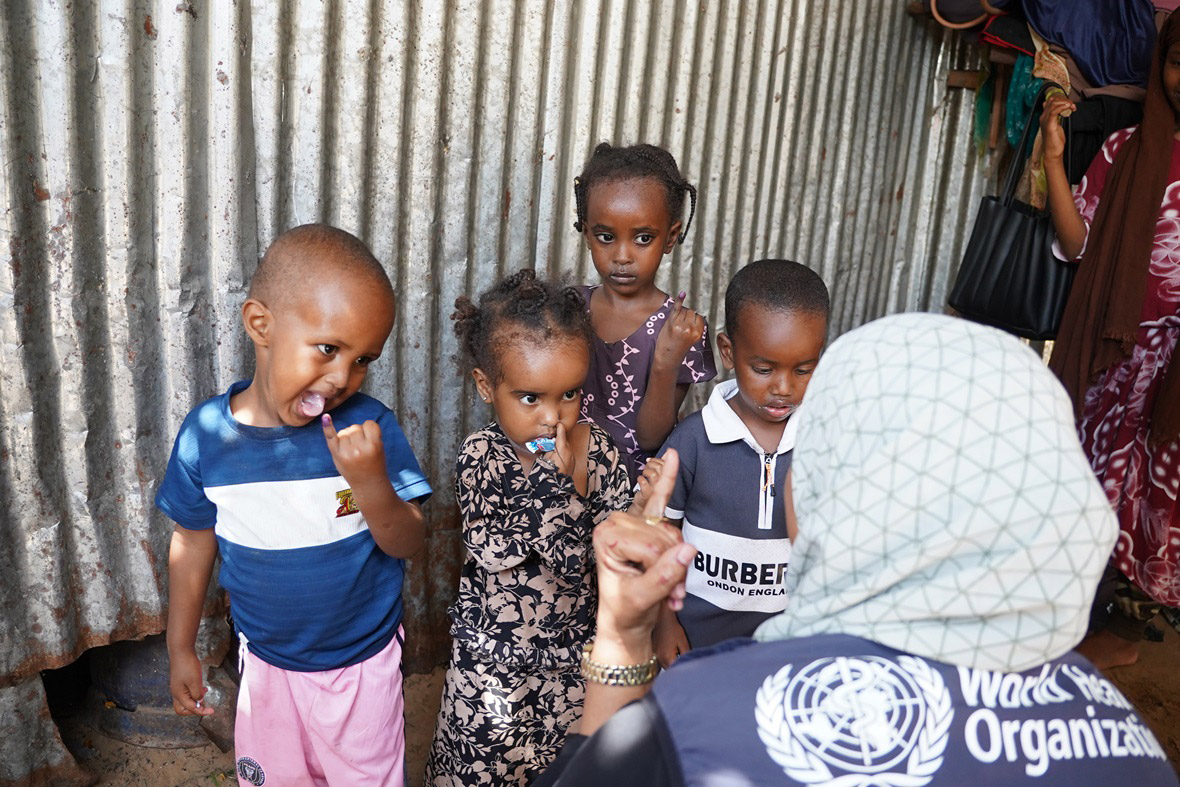 “Investments and coordinated efforts to strengthen Somalia’s child immunization programme are yielding high results,” said UNICEF Acting Representative in Somalia Nisar Syed. “For example, UNICEF is leading on improving vaccine storage capacity and the ability to keep them at the right temperature. To date, 90% of health facilities providing vaccinations have been equipped with solar-powered refrigeration. Together with the ministries of health, our dedicated partners and resilient health workers, children are being reached with lifesaving vaccines, even in some of the most difficult and hard-to-reach places.”
“Investments and coordinated efforts to strengthen Somalia’s child immunization programme are yielding high results,” said UNICEF Acting Representative in Somalia Nisar Syed. “For example, UNICEF is leading on improving vaccine storage capacity and the ability to keep them at the right temperature. To date, 90% of health facilities providing vaccinations have been equipped with solar-powered refrigeration. Together with the ministries of health, our dedicated partners and resilient health workers, children are being reached with lifesaving vaccines, even in some of the most difficult and hard-to-reach places.”
WUENIC 2024 findings that the number of zero-dose children has decreased in countries that, like Somalia, are supported by Gavi, the Vaccine Alliance, underscores the importance of investing in immunization. Key partners, including the Global Polio Eradication Initiative (GPEI), the UK Foreign, Commonwealth and Development Office (FCDO), the World Bank and the Gates Foundation have been instrumental in improving child survival rates.
Now is the time to build on these gains and sustain momentum towards the Immunization Agenda 2030 which aims to ensure that everyone, everywhere, at every age, fully benefits from vaccines to improve health and well-being.
View the WUENIC report here
For more information, contact:
Mohamed Osman, Federal Ministry of Health and Human Services Head of Communication and Public Engagement,
Lisa Hill, UNICEF Somalia Communication Specialist,
Khadar Hared, WHO Somalia Communication Officer,
A shot at a healthier future: Somali mothers embrace lifesaving vaccines for their children
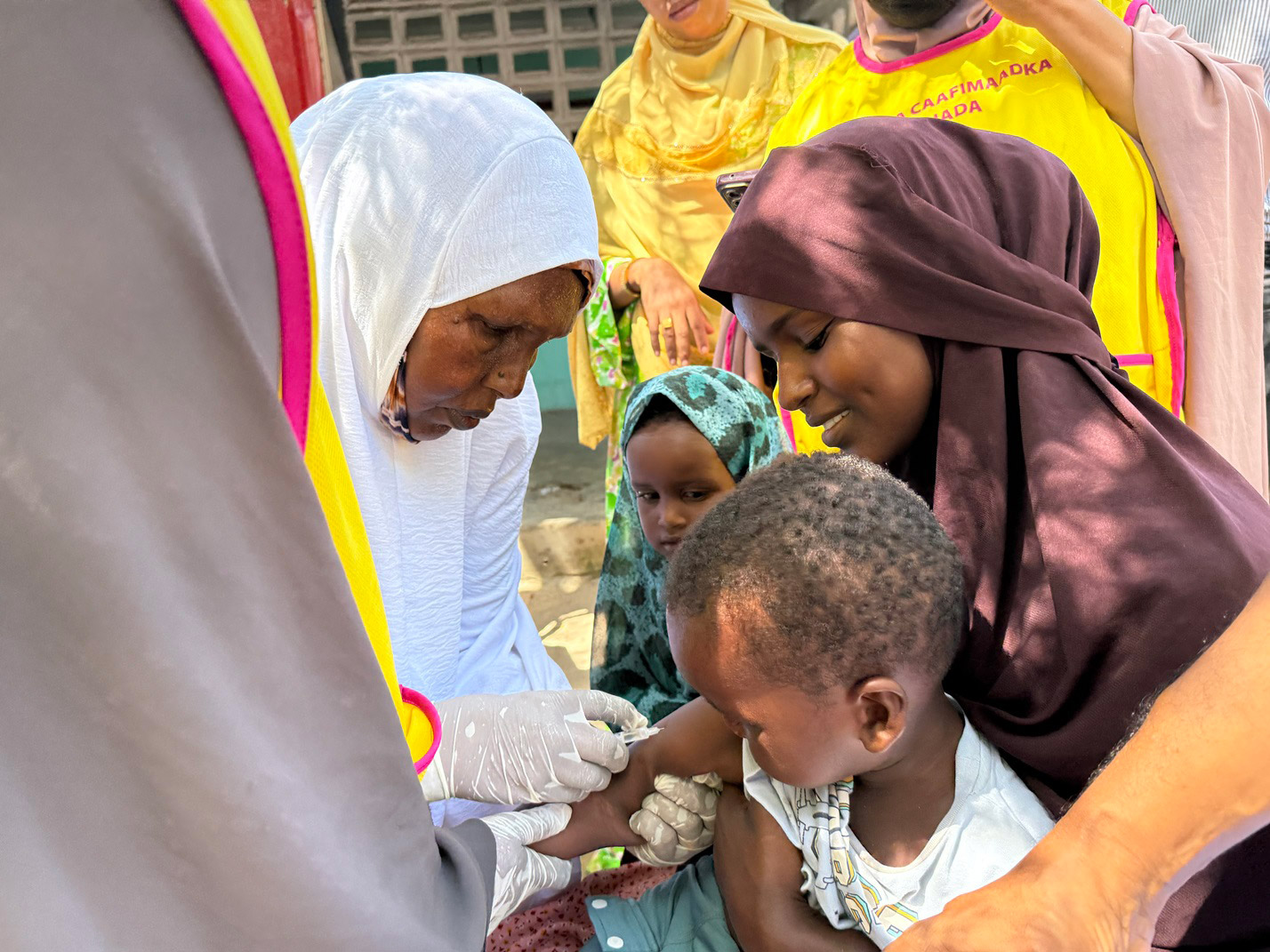 30 June 2025, Mogadishu, Somalia – Mothers visited the Hamar Jajab Maternal and Child Health Centre in Banadir region on a hot morning in May, babies cradled in one arm, toddlers clinging to the other, to join the queues of caregivers waiting under the shade of a big tree inside the facility, all hoping to get their children vaccinated.
30 June 2025, Mogadishu, Somalia – Mothers visited the Hamar Jajab Maternal and Child Health Centre in Banadir region on a hot morning in May, babies cradled in one arm, toddlers clinging to the other, to join the queues of caregivers waiting under the shade of a big tree inside the facility, all hoping to get their children vaccinated.
The Centre is among 8653 fixed sites that co-delivered measles, pneumococcal conjugate vaccine (PCV) and polio vaccines as part of the first integrated campaign of its kind to protect Somali children from measles, pneumonia, and polio.
Translating government willpower into action
The integrated campaign provides a model of how to translate political commitment into action and safeguard children from preventable diseases.
In April 2025, Somalia introduced the PCV into the national immunization programme in an initiative led by the Federal Ministry of Health, with support from WHO, UNICEF, Gavi, and other partners. Simultaneously, there has been high-level commitment to respond to poliovirus as soon as it is detected.
As part of the integrated campaign, health workers provided measles and PCV vaccines to children across the country, while in Somaliland, Puntland, and parts of Galmudug, oral polio vaccine (nOPV2) was administered to children to combat the spread of variant poliovirus detected in December 2024
These campaigns provided measles vaccines to 3.3 million children aged between 6 months and five years, PCV to 2.6 million children aged between 1 and 5 years, and polio vaccine to 1.6 million children aged under 5 years, improving immunization coverage, reducing the risk of outbreaks and contributing to a healthier future for Somalia’s children.
Mothers’ relief at having access to a suite of vaccines
 Mulki Osman Ali, a 26-year-old mother of 2 – a son aged 2 and a daughter just over one-and-a-half years old – was among the mothers present at the health centre in Hamar Jajab. She explained this was the first time her children had the opportunity to receive the PCV and rotavirus vaccines.
Mulki Osman Ali, a 26-year-old mother of 2 – a son aged 2 and a daughter just over one-and-a-half years old – was among the mothers present at the health centre in Hamar Jajab. She explained this was the first time her children had the opportunity to receive the PCV and rotavirus vaccines.
“For a long time, I worried that my children were missing out on important vaccines that children in other countries receive,” she said. “When I heard these vaccines were finally available in the country, I didn’t wait. I wanted to be among the first to protect my children from diseases that have claimed the lives of so many others.”
Her words reflect the commitment of Somali parents who are determined to give their children a healthier, safer future.
Outreach campaign in remote areas
Health workers, including supervisors from WHO Somalia and other partners who helped oversee the campaign, worked tirelessly to deliver the vaccines and ensure the campaign’s success.
In remote and underserved areas, where communities have limited access to health care services, outreach and mobile strategies played a crucial role in reaching and protecting children from life-threatening diseases.
“We administered 3 vaccines to children, to protect children against measles, polio and pneumonia. Measles is currently widespread in the country, and we reached many parents and children who hadn’t been able to reach health facilities. By going into their neighbourhoods, we provided opportunities for more children to be vaccinated. These vaccines help prevent outbreaks of poliovirus and respiratory infections that can develop into pneumonia. Parents believe in the benefits of vaccination. During the integrated vaccination campaign we vaccinated many children, sometimes reaching over 100 individuals, in a day” said Ladan Ahmed, a health worker in Hargeisa, Somaliland.
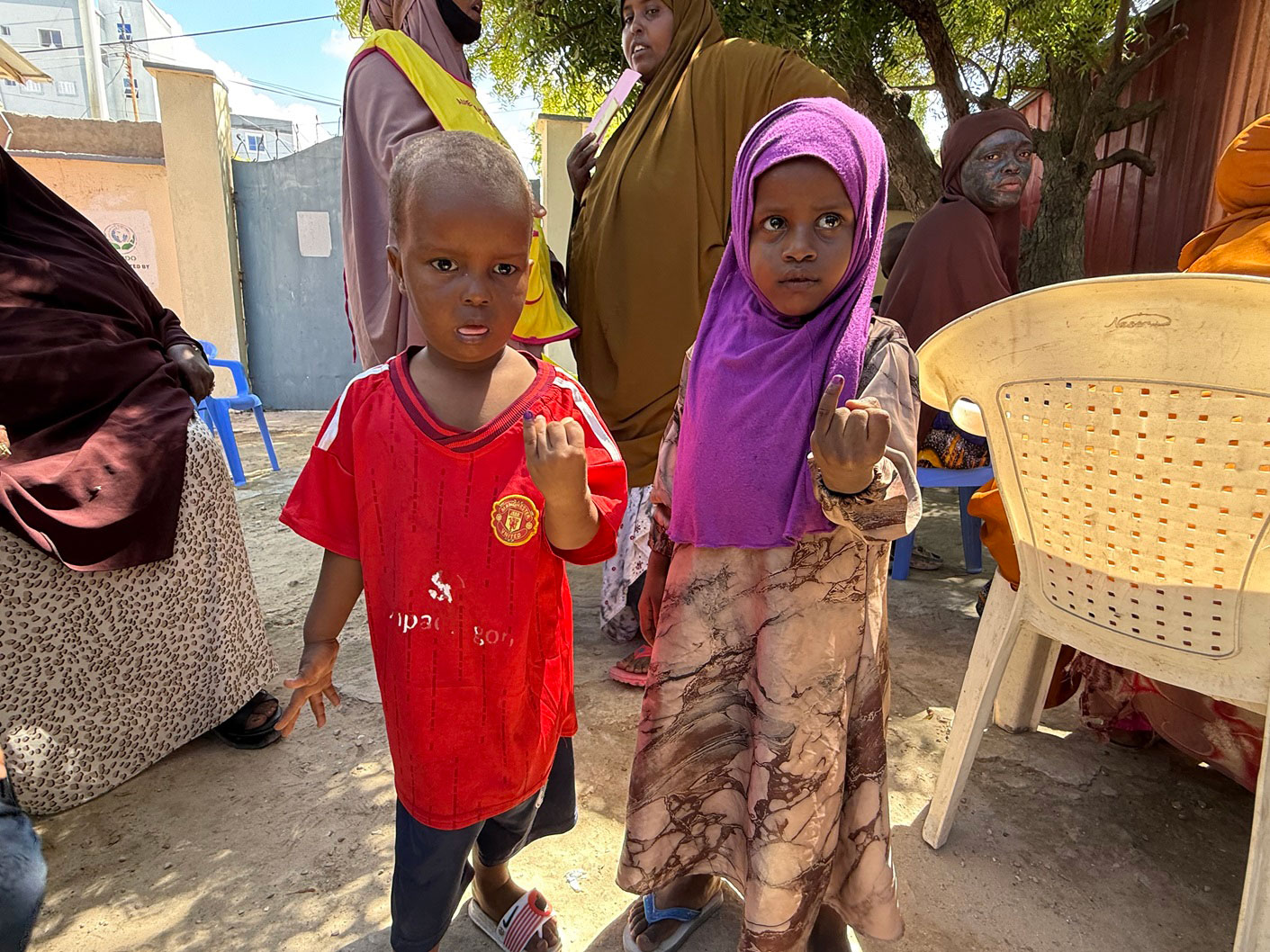 Community trust in local health workers is a cornerstone of successful vaccination efforts, in a society where both parents play crucial roles in ensuring children can access health care.
Community trust in local health workers is a cornerstone of successful vaccination efforts, in a society where both parents play crucial roles in ensuring children can access health care.
“I’ve always made sure my children are vaccinated. I have 3 children — 11, 9 and 3 years old. Today, my youngest just received his vaccines. Vaccines protect children from measles, and many other illnesses. I encourage all mothers to vaccinate their children. The health worker is someone we know and trust. They visit us regularly and are always ready to help,” said Gudon Omar Yusuf.
Though challenges persist, Somalia is making strides in its vaccination efforts thanks to the leadership of the health authorities with the support of Gavi, WHO and UNICEF Somalia and many other partners.
Strengthened trust in health workers, coupled with expanded outreach to remote communities, is closing immunization gaps, leading the shift towards protecting more children and promoting long-term health throughout the country.
For more information, please contact:
Khadar Hared, Communication Officer, WHO Somalia
Tel: +252619800011
Email:








